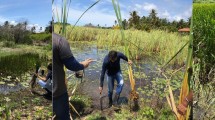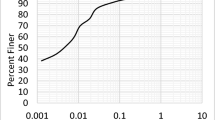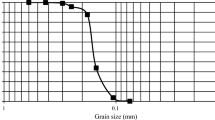Abstract
Natural geotextiles play a remarkable role in erosion control, promoting slope stability and protecting areas susceptible to environmental degradation. In this study, we evaluated the mechanical performance of geotextiles manufactured from natural fibers of Syagrus coronata (Mart.) Becc., Thypha domingensis, and Eleocharis sp. These geotextiles were treated with waterproofing resin and exposed to biodegradation for 120 days in order to understand their stress and strain behavior. A colorless wood waterproofing resin from Hydronorth® was used in order to make it less permeable, delay the degradation process, and consequently increase the material’s resistance to climatic variables. Subsequently, the geotextiles were subjected to natural degradation on slope in an area of 10m2 sizes. Samples of the geotextiles exposed to the degradation processes were collected every 30 days. The results indicate that, after treatment with the resin, Thypha domingensis geotextile outperforming the other tested fibers in terms of maximum tensile strength. The addition of two Layers of waterproofing resin (Layer B) resulted in higher fiber rupture resistance compared to fibers treated with a single Layer of resin (Layer A) without compromising the natural performance of the fibers. Syagrus coronata fiber when treated with one Layer (Layer A) exhibits greater resistance to deformation after 120 days compared to other fibers. A gradual degradation of Eleocharis sp. was observed. These findings present a strong potential for the incorporation of these studied geotextiles from natural fibers in endeavors related to soil bioengineering works, although it is necessary to employ associated protection techniques to adapt these fibers to technical requirements.



Similar content being viewed by others
Data availability
All data generated or analyzed during this study are included in this published article (and its supplementary information files).
References
Prambauer M, Wendeler C, Weitzenböck J, Burgstaller C (2019) Biodegradable geotextiles – an overview of existing and potential materials. Geotext Geomembr 47:48–59. https://doi.org/10.1016/J.GEOTEXMEM.2018.09.006
Wu H, Yao C, Li C, Miao M, Zhong Y, Lu Y et al (2020) Review of application and innovation of geotextiles in geotechnical engineering. Materials 13:1774. https://doi.org/10.3390/ma13071774
Dixon N, Raja J, Fowmes G, Frost M (2016) Sustainability aspects of using geotextiles. In: Geotextiles. Elsevier, pp 577–596. https://doi.org/10.1016/B978-0-08-100221-6.00026-7
Goud GN, Mouli SS, Umashankar B, Sireesh S, Madhira RM (2020) Design and sustainability aspects of geogrid-reinforced flexible pavements—an Indian perspective. Front Built Environ 6:71. https://doi.org/10.3389/fbuil.2020.00071
Prabhu L, Krishnaraj V, Sathish S, Gokulkumar S, Karthi N, Rajeshkumar L et al (2021) A review on natural fiber reinforced hybrid composites: chemical treatments, manufacturing methods and potential applications. Mater Today Proc 45:8080–8085. https://doi.org/10.1016/j.matpr.2021.01.280
Pregi E, Kun D, Faludi G, Móczó J, Pukánszky B (2022) Modeling the mechanical properties of polypropylene/lignin/flax hybrid composites. Mater Des 220:110833. https://doi.org/10.1016/j.matdes.2022.110833
Benessalah I, Arab A, Villard P, Merabet K, Bouferra R (2016) Shear strength response of a geotextile-reinforced Chlef sand: a laboratory study. Geotech Geol Eng 34:1775–1790. https://doi.org/10.1007/s10706-016-9988-7
Acosta-Calderon S, Gordillo-Silva P, García-Troncoso N, Bompa DV, Flores-Rada J (2022) Comparative evaluation of sisal and polypropylene fiber reinforced concrete properties. Fibers 10:31. https://doi.org/10.3390/fib10040031
Vigneshwaran S, Sundarakannan R, John KM, Joel Johnson RD, Prasath KA, Ajith S et al (2020) Recent advancement in the natural fiber polymer composites: a comprehensive review. J Clean Prod 277:124109. https://doi.org/10.1016/J.JCLEPRO.2020.124109
Fontes C dos S, Holanda FSR, Filho RN de A, Santos LDV, Lino JB, Moura MM. Erosion control with geotextiles from natural fibers in the margin of the São Francisco river. Caminhos de Geografia 2021;22: 25–35. https://doi.org/10.14393/RCG228456549.
Holanda FSR, Santos LDV, De Melo JCR, Boge GM, Sussuchi EM, Nascimento BL et al (2023) Geotechnical changes of Thypha domingensis fiber-derived geotextile under degradation due to climatic variables. Int J Adv Manuf Technol
Pelyk LV, Vasylechko VO, Kyrychenko OV (2019) Influence of biodestructors on the wear resistance of polyester geotextile materials. Colloids Interfaces 3:21. https://doi.org/10.3390/COLLOIDS3010021
Marczak D, Lejcuś K, Grzybowska-Pietras J, Biniaś W, Lejcuś I, Misiewicz J (2020) Biodegradation of sustainable nonwovens used in water absorbing geocomposites supporting plants vegetation. Sustain Mater Technol 26:e00235. https://doi.org/10.1016/J.SUSMAT.2020.E00235
Bachchan AA, Das PP, Chaudhary V (2022) Effect of moisture absorption on the properties of natural fiber reinforced polymer composites: a review. Mater Today Proc 49:3403–3408. https://doi.org/10.1016/J.MATPR.2021.02.812
Fatehi H, Ong DEL, Yu J, Chang I (2021) Biopolymers as green binders for soil improvement in geotechnical applications: a review. Geosciences 11:291. https://doi.org/10.3390/GEOSCIENCES11070291
Karimah A, Ridho MR, Munawar SS, Adi DS, Ismadi DR et al (2021) A review on natural fibers for development of eco-friendly bio-composite: characteristics, and utilizations. J Mater Res Technol 13:2442–2458. https://doi.org/10.1016/J.JMRT.2021.06.014
Das PP, Acharya A, Chaudhary V (2021) Influence of moisture uptake on the mechanical properties of natural fiber-reinforced polymer composites. In: Composite Materials, First edn. CRC Press, Boca Raton, FL, pp 213–222. https://doi.org/10.1201/9781003080633-12
Franco YB, Valentin CA, Kobelnik M, Lins da Silva J, Ribeiro CA, da Luz MP (2022) Accelerated aging ultraviolet of a PET nonwoven geotextile and thermoanalytical evaluation. Materials 15:4157. https://doi.org/10.3390/ma15124157
Arora M, Dutta RK, Soni DK (2019) Bearing ratio behavior of sand overlying silty sand and reinforced with treated coir geotextiles. J Nat Fiber 18:834–844. https://doi.org/10.1080/15440478.2019.1658255
Pavli F, Argyri AA, Skandamis P, Nychas GJ, Tassou C, Chorianopoulos N (2019) Antimicrobial activity of oregano essential oil incorporated in sodium alginate edible films: control of Listeria monocytogenes and spoilage in ham slices treated with high pressure processing. Materials 12:3726. https://doi.org/10.3390/ma12223726
Ran W, Lian J, Zhang J (2022) Evaluation and modeling of fungi towards wood degradation. Bioengineered 13:3284–3299. https://doi.org/10.1080/21655979.2022.2025699
Poyatos F, Morales F, Nicholson AW, Giordano A (2018) Physiology of biodeterioration on canvas paintings. J Cell Physiol 233:2741–2751. https://doi.org/10.1002/jcp.26088
Goodell B, Winandy JE, Morrell JJ (2020) Fungal degradation of wood: emerging data, new insights and changing perceptions. Coatings 10:1210. https://doi.org/10.3390/COATINGS10121210
Ali A, Shaker K, Nawab Y, Jabbar M, Hussain T, Militky J et al (2018) Hydrophobic treatment of natural fibers and their composites—a review. J Ind Text 47:2153–2183. https://doi.org/10.1177/1528083716654468
Ramesh M (2016) Kenaf (Hibiscus cannabinus L.) fibre based bio-materials: a review on processing and properties. Prog Mater Sci 78:1–92. https://doi.org/10.1016/J.PMATSCI.2015.11.001
Bajracharya RM, Manalo AC, Karunasena W, Lau K (2014) An overview of mechanical properties and durability of glass-fibre reinforced recycled mixed plastic waste composites. Mater Des 62:98–112. https://doi.org/10.1016/j.matdes.2014.04.081
Guo M, Wang W, Shi Q, Chen T, Kang H, Li J (2019) An experimental study on the effects of grass root density on gully headcut erosion in the gully region of China’s Loess Plateau. Land Degrad Dev 30:2107–2125. https://doi.org/10.1002/ldr.3404
Janasekaran S, Lei Z, Jun TR, Yunn LJ, Singh A (2022) Green composites reinforced with natural fibers: a review on mechanical properties. Adv Struct Mater 166:1–9. https://doi.org/10.1007/978-3-030-89992-9_1/COVER
Rajeshkumar G, Arvindh Seshadri S, Devnani GL, Sanjay MR, Siengchin S, Prakash Maran J et al (2021) Environment friendly, renewable and sustainable poly lactic acid (PLA) based natural fiber reinforced composites – a comprehensive review. J Clean Prod 310:127483. https://doi.org/10.1016/J.JCLEPRO.2021.127483
Saha P, Roy D, Manna S, Adhikari B, Sen R, Roy S (2012) Durability of transesterified jute geotextiles. Geotext Geomembr 35:69–75. https://doi.org/10.1016/J.GEOTEXMEM.2012.07.003
Holanda FSR, de Castro JDS, Santos LDV, de Andrade CEC, Griza S, Rodrigues Junior JJ et al (2020) Degradation of geotextiles of Typha latifolia Linn used in soil bioengineering techniques. Ciência Florestal 30:1147–1160. https://doi.org/10.5902/1980509842416
Kushwaha PK, Kumar R (2010) Influence of chemical treatments on the mechanical and water absorption properties of bamboo fiber composites. J Reinf Plast Compos 30:73–85. https://doi.org/10.1177/0731684410383064
Khieng TK, Debnath S, Ting E, Liang C, Anwar M, Pramanik A et al (2021) A review on mechanical properties of natural fibre reinforced polymer composites under various strain rates. J Compos Sci 5:130. https://doi.org/10.3390/JCS5050130
Hegazy AK, Abdel-Ghani NT, El-Chaghaby GA (2011) Phytoremediation of industrial wastewater potentiality by Typha domingensis. Int J Environ Sci Technol 8:639–648. https://doi.org/10.1007/BF03326249/METRICS
Greenhouse J, Markos S, Moe RL, Simono S, Wetherwax M, Vorobik LA (2012) Vascular plants of California, 2nd edn. University of California Press
He D, Simoneit BRT, Jara B, Jaffé R (2015) Gas chromatography mass spectrometry based profiling of alkyl coumarates and ferulates in two species of cattail (Typha domingensis P., and Typha latifolia L.). Phytochem Lett 13:91–98. https://doi.org/10.1016/j.phytol.2015.05.010
Hotchkiss N, Dozier HL (1949) Taxonomy and distribution of N. American cat-tails American Midland Naturalist 41:237. https://doi.org/10.2307/2422028
Les DH (2020) Aquatic monocotyledons of North America : ecology, life history, and systematics, vol 1, 1st edn. Taylor & Francis e Books
Deguenon HEJ, Guevara N, Tometin LAS, Guehou MS, Aina MP, Sohounhloue CKD (2022) Influence of the stage number on the quality of domestic waste water treated with Typha domingensis filter plants. Chem Sci Int J:1–10. https://doi.org/10.9734/CSJI/2022/v31i5819
Gonçalves LJB, Santo-Silva EE, Barros MF, Rito KF, Leal IR, Tabarelli M (2020) The palm Syagrus coronata proliferates and structures vascular epiphyte assemblages in a human-modified landscape of the Caatinga dry forest. J Trop Ecol 36:123–132. https://doi.org/10.1017/S0266467420000073
Drumond MA (2007) Licuri Syagrus coronata (Mart.) Becc. Embrapa Semi-Árido:16
Lima VVF (2019) Modelos de distribuição potencial e ecologia populacional de Syagrus coronata (Martius) Beccari - Arecaceae (licuri): recomendações para a conservação e o manejo de um importante PFNM para as regiões semiáridas do Nordeste do Brasil. Thesis. Universidade Federal de Brasília
Lorenzi H, de Souza HM, JTM C (2004) Cerqueira LSC de, Ferreira EJL. Palmeiras brasileiras e exóticas cultivadas
Bagaldo AR, Miranda GS, Soares Júnior MSF, de Araújo FL, Matoso RVM, Chizzotti ML et al (2019) Effect of Licuri cake supplementation on performance, digestibility, ingestive behavior, carcass traits and meat quality of grazing lambs. Small Rumin Res 177:18–24. https://doi.org/10.1016/J.SMALLRUMRES.2019.05.020
Ribeiro Daza A, Souza JG, Monnerat JPIS, Ribeiro CVDM (2021) Performance of growing lambs supplemented with ground licuri (Syagrus coronata). Anim Biosci 34:1014
López-Juambeltz F, Rodríguez-Gallego L, Dabezíes JM, Chreties C, Narbondo S, Conde D (2020) A GIS-based assessment combined with local ecological knowledge to support the management of Juncus acutus L. spreading in the floodplain of a protected coastal lagoon. J Nat Conserv 57:125891. https://doi.org/10.1016/J.JNC.2020.125891
Xia L, Zhang C, Wang A, Wang Y, Xu W (2020) Morphologies and properties of Juncus effusus fiber after alkali treatment. Cellulose 27:1909–1920. https://doi.org/10.1007/S10570-019-02933-9/METRICS
Tackholm V, Boulos L. Students’ flora of Egypt 1974.
Hassanen S, Hassan Y (2023) Current status of some plants distribution in specific phytogeographical region of Egypt. Taeckholmia 43:13–16. https://doi.org/10.21608/taec.2023.185560.1045
El-Shamy AI, Abdel-Razek AF, Nassar MI (2015) Phytochemical review of Juncus L. genus (Fam. Juncaceae). Arab J Chem 8:614–623. https://doi.org/10.1016/J.ARABJC.2012.07.007
Freitas JG, Gabrielle VGN, Flores LNP, Batista FRDC (2021) Coleta Material Botânico - Guia Prático, vol 1, 1st edn, Campina Grande-PB
ABNT ABDNT. Geotêxteis – Determinação da resistência à tração não-confinada – Ensaio de tração de faixa larga. NBR 12824. 1993. 1993.
Wang K, Chen Y, Long H, Baghani M, Rao Y, Peng Y (2021) Hygrothermal aging effects on the mechanical properties of 3D printed composites with different stacking sequence of continuous glass fiber Layers. Polym Test 100:107242. https://doi.org/10.1016/j.polymertesting.2021.107242
Barker LE, Shaw KM (2015) Best (but oft-forgotten) practices: checking assumptions concerning regression residuals. Am J Clin Nutr 102:533–539. https://doi.org/10.3945/AJCN.115.113498
Cohen J (2013) Statistical power analysis for the behavioral sciences. In: Statistical Power Analysis for the Behavioral Sciences. Academic press. https://doi.org/10.4324/9780203771587
Haukoos J (2005) Medicine RL-A emergency, 2005 undefined. Advanced Statistics: Bootstrapping Confidence Intervals for Statistics with “Difficult” Distributions, vol 12. Wiley Online Library, pp 360–365. https://doi.org/10.1197/j.aem.2004.11.018
Miszkowska A, Lenart S, Koda E (2017) Changes of permeability of nonwoven geotextiles due to clogging and cyclic water flow in laboratory conditions. Water 9:660. https://doi.org/10.3390/W9090660
Wiewel BV, Lamoree M (2016) Geotextile composition, application and ecotoxicology—a review. J Hazard Mater 317:640–655. https://doi.org/10.1016/J.JHAZMAT.2016.04.060
Tanasă F, Nechifor M, Ignat ME, Teacă CA (2022) Geotextiles—a versatile tool for environmental sensitive applications in geotechnical engineering. Textiles 2:189–208. https://doi.org/10.3390/TEXTILES2020011
Carneiro JR, Lopes ML (2017) Natural weathering of polypropylene geotextiles treated with different chemical stabilisers. Geosynth Int 24:544–553. https://doi.org/10.1680/jgein.17.00020
Sumi S, Unnikrishnan N, Mathew L (2017) Surface modification of coir fibers for extended hydrophobicity and antimicrobial property for possible geotextile application. J Nat Fibers 14:335–345. https://doi.org/10.1080/15440478.2016.1209714
Cichosz S, Masek A, Wolski K (2019) Innovative cellulose fibres reinforced ethylene-norbornene copolymer composites of an increased degradation potential. Polym Degrad Stab 159:174–183. https://doi.org/10.1016/j.polymdegradstab.2018.11.029
Ren W, Guo F, Zhu J, Cao M, Wang H, Yu Y (2021) A comparative study on the crystalline structure of cellulose isolated from bamboo fibers and parenchyma cells. Cellulose 28:5993–6005. https://doi.org/10.1007/s10570-021-03892-w
Tan W, Fu F, Wang F-F, Li Y, Wang P, Zhang D (2022) The mechanical and ultraviolet aging properties of needle-punched nonwoven geotextiles made with recycled fibers. J Ind Text 51:8668S–8689S. https://doi.org/10.1177/1528083720921580
Vivek DRK, Parti R (2020) Application potential of treated coir geotextiles in unpaved roads. J Nat Fibers 17:1454–1467. https://doi.org/10.1080/15440478.2019.1578718
Gao YX, Zhu HH, Ni YF, Wei C, Shi B (2022) Experimental study on uplift behavior of shallow anchor plates in geogrid-reinforced soil. Geotext Geomembr 50:994–1003. https://doi.org/10.1016/J.GEOTEXMEM.2022.06.006
Pillai RR, Thomas V (2023) Plasma surface engineering of natural and sustainable polymeric derivatives and their potential applications. Polymers (Basel) 15:400. https://doi.org/10.3390/polym15020400
Martín del Campo AS, Robledo-Ortíz JR, Arellano M, Rabelero M, Pérez-Fonseca AA (2021) Accelerated weathering of polylactic acid/agave fiber biocomposites and the effect of fiber–matrix adhesion. J Polym Environ 29:937–947. https://doi.org/10.1007/s10924-020-01936-z
Sánchez ML, Patiño W, Cárdenas J (2020) Physical-mechanical properties of bamboo fibers-reinforced biocomposites: influence of surface treatment of fibers. J Build Eng 28:101058. https://doi.org/10.1016/j.jobe.2019.101058
Liu Y, Xie J, Wu N, Wang L, Ma Y, Tong J (2019) Influence of silane treatment on the mechanical, tribological and morphological properties of corn stalk fiber reinforced polymer composites. Tribol Int 131:398–405. https://doi.org/10.1016/J.TRIBOINT.2018.11.004
Khalid MY, Al Rashid A, Arif ZU, Ahmed W, Arshad H, Zaidi AA (2021) Natural fiber reinforced composites: sustainable materials for emerging applications. Results Eng 11:100263. https://doi.org/10.1016/J.RINENG.2021.100263
Daria M, Krzysztof L, Jakub M (2020) Characteristics of biodegradable textiles used in environmental engineering: a comprehensive review. J Clean Prod 268:122129. https://doi.org/10.1016/j.jclepro.2020.122129
Varello R, Wetzel MA, Cima F (2021) Two facets of geotextiles in coastal ecosystems: anti- or profouling effects? Mar Environ Res 170:105414. https://doi.org/10.1016/j.marenvres.2021.105414
Broda J, Gawlowski A, Laszczak R, Mitka A, Przybylo S, Grzybowska-Pietras J et al (2017) Application of innovative meandrically arranged geotextiles for the protection of drainage ditches in the clay ground. Geotext Geomembr 45:45–53. https://doi.org/10.1016/j.geotexmem.2016.07.003
Ferreira FB, Vieira CS, Lopes MD (2020) Pullout behavior of different geosynthetics—influence of soil density and moisture content. Front Built Environ:6. https://doi.org/10.3389/fbuil.2020.00012
Acknowledgements
Thanks to the riverine communities of The Lower São Francisco River, helping in the manufacturing of protoLayers of geotextiles based on the experience on the fiber crafts works.
Code availability
No custom code used.
Author information
Authors and Affiliations
Corresponding author
Ethics declarations
Conflict of interest
The authors declare no competing interests.
Additional information
Publisher’s note
Springer Nature remains neutral with regard to jurisdictional claims in published maps and institutional affiliations.
Rights and permissions
Springer Nature or its licensor (e.g. a society or other partner) holds exclusive rights to this article under a publishing agreement with the author(s) or other rightsholder(s); author self-archiving of the accepted manuscript version of this article is solely governed by the terms of such publishing agreement and applicable law.
About this article
Cite this article
Holanda, F.S.R., Santos, L.D.V., De Melo, J.C.R. et al. Comparison of mechanical performance of different geotextiles manufactured from natural fibers subjected to environmental biodegradation. Int J Adv Manuf Technol 129, 3863–3873 (2023). https://doi.org/10.1007/s00170-023-12549-w
Received:
Accepted:
Published:
Issue Date:
DOI: https://doi.org/10.1007/s00170-023-12549-w




